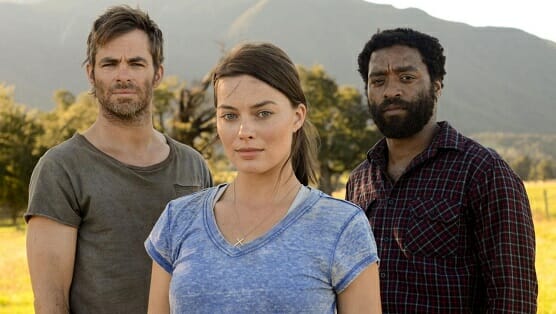Z for Zachariah

Post-apocalyptic survival is the catalyst for romantic moral drama in Z for Zachariah, a story about a trio of people who find themselves uneasily attempting to coexist in a remote valley left untouched by a deadly nuclear holocaust. Retaining the basic premise of its source material, Robert C. O’Brien’s 1974 children’s book, director Craig Zobel’s follow-up to his 2012 indie hit Compliance reimagines its story in somewhat drastic ways. The film concerns a young backwoods girl named Ann Burden (Margot Robbie) whose familial valley—in an unspecified American West state—has been spared from the environmental catastrophe that decimated most of the country (if not the world). It’s a safe haven of lush forests, clean ponds and plentiful wildlife for food—a veritable Eden with Ann, who’s prone to praying before meals and playing the organ in a chapel that her preacher father built, as its de facto Eve.
Flipping its overt biblical setup on its head, danger to this paradise first comes in the form of the story’s nominal Adam, John Loomis (Chiwetel Ejiofor), a doctor who appears wearing a chemical-protection suit that he, upon realizing the valley is not polluted, discards before plunging into a nearby waterfall-adorned pond. That bathing spot turns out to still be radioactive, thus compelling Ann to emerge from hiding to rescue him and, using his drugs and her cooking, nurse him back to health. At the outset, theirs is a tentative relationship forged by circumstance, and Zobel stages their early encounters with protracted, single-take close-ups that allow their shifting emotional conditions—marked by suspicion, anger, fear and hope—to develop.
While Nissar Modi’s script provides both Ejiofor and Robbie with stretches of silence that let them wordlessly convey their characters’ inner thoughts and feelings, its dialogue is often too on the nose, especially when it comes to Ann’s and John’s differing attitudes toward religion. Presenting Ann as a country lass convinced she was saved by God, and John as a man of science who has no interest in higher powers, Z for Zachariah makes its central dynamic so stark that it weighs down the material. That only becomes more pronounced once John comes up with an idea to construct a giant wheel that, when used in conjunction with the nearby waterfall, will provide Ann’s house with electricity (and thus allow them to refrigerate food for the winter)—a great idea complicated by the fact that, to build the contraption, they must destroy the church for materials.
-

-

-

-

-

-

-

-

-

-

-

-

-

-

-

-

-

-

-

-

-

-

-

-

-

-

-

-

-

-

-

-

-

-

-

-

-

-

-

-








































